‘Being told I would die made me live’: Three incredible tales of survival
When you’re delivered a life-threatening diagnosis, how do you find silver linings? These Queenslanders did, and they will make you rethink what’s important in life.
QWeekend
Don't miss out on the headlines from QWeekend. Followed categories will be added to My News.
What is it like to live a life when you may not have a tomorrow?
How do you find happiness when life has turned on you in the cruellest of ways?
According to these three Queenslanders, who have been delivered life-threatening diagnoses, you learn to find silver linings and gratitude when it seems almost impossible.
Against all odds, Carly, Adam and Kate overcame brutal illnesses and their brush with death.
It changed them forever and, they say, for the better as they vowed to live their days to the fullest and focus on what truly matters. Not work, pay packets or petty arguments.
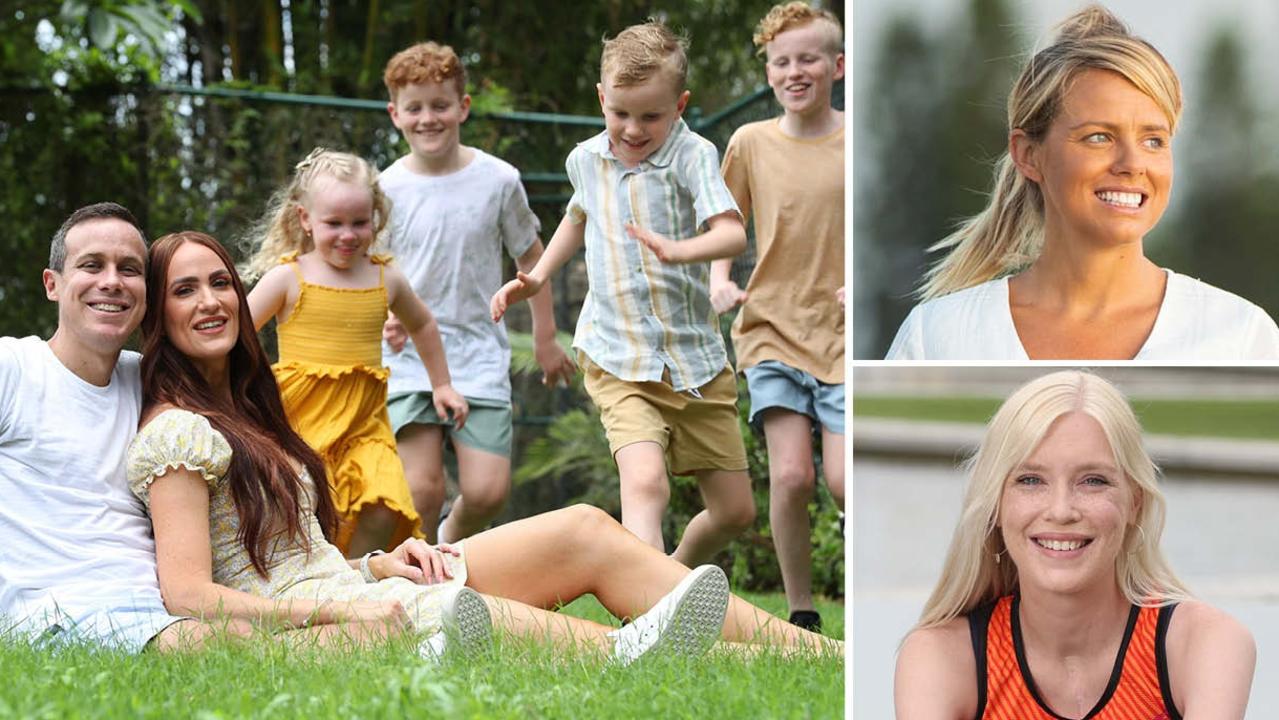
It’s the little things; being able to sing along to a song on the radio, play chess with the kids and jog in the sunshine.
They’re the moments they dreamt about when they thought it might all be gone forever.
Last year shaped a powerful desire in us all to be grateful.
As we enter a new year full of personal goals and dreams, these three warriors share how to truly make every day count.
CARLY MAYBERRY
How can there be positives when you’re staring death in the face?
Carly Mayberry, 31, knows how to find them after she was diagnosed with an incurable cancer at 30. The then-Brisbane woman went looking for them in her darkest and sickest days when she could’ve so easily given in but vowed instead to take a different approach.
It’s been almost two years since Mayberry was diagnosed with stage four metastatic breast cancer that had spread into her bones.
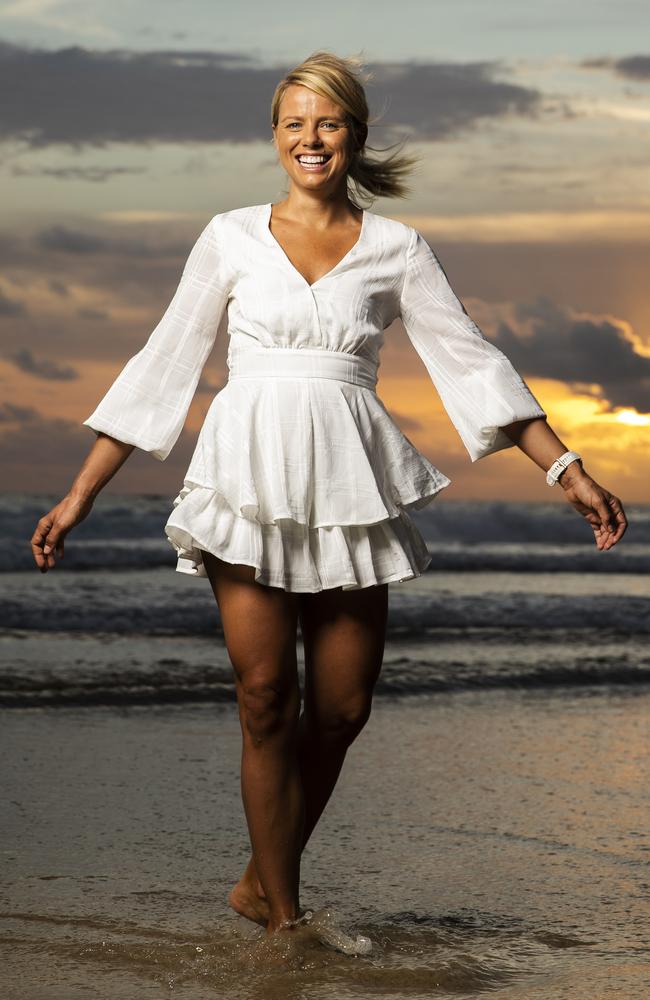
In 2019, Mayberry thought she was in the most perfect situation; on a 10-day holiday in Vietnam, cycling through markets, lazing on beaches and haggling with locals as she tasted a world of new and exotic foods. Her biggest care was where to explore next and how she was going to get there.
She was on the adventure of a lifetime, having left Brisbane a few years earlier to travel.
From Vietnam, she was bound for Europe to work as a guide in the summer tourist season.
She had so much to look forward to. Life was exciting. Life was good. Until it wasn’t.
Until the day Mayberry discovered a lump on her breast. She was only 30, she thought, far too young to get cancer.
But back home in Brisbane Mayberry had worked in the health industry as a clinical psychologist and knew enough to realise she needed to act fast. She made her way to Vietnam’s capital, Hanoi, and had a mammogram and ultrasounds. When they were unable to give her a clear result, she flew back to London, her home base at the time.
In a breast clinic in Harley St in the British capital, doctors delivered Mayberry her grim diagnosis. “It was quite terrifying,” recalls Mayberry, who now lives on the Sunshine Coast. “That turned my life very much upside down.
“A cancer diagnosis is so scary because of the uncertainty it brings with it.
To be in that position at such a young age is challenging because it’s hard. You don’t know people who have been through that experience, you don’t really have any idea or awareness of what that means, what treatment looks like.”
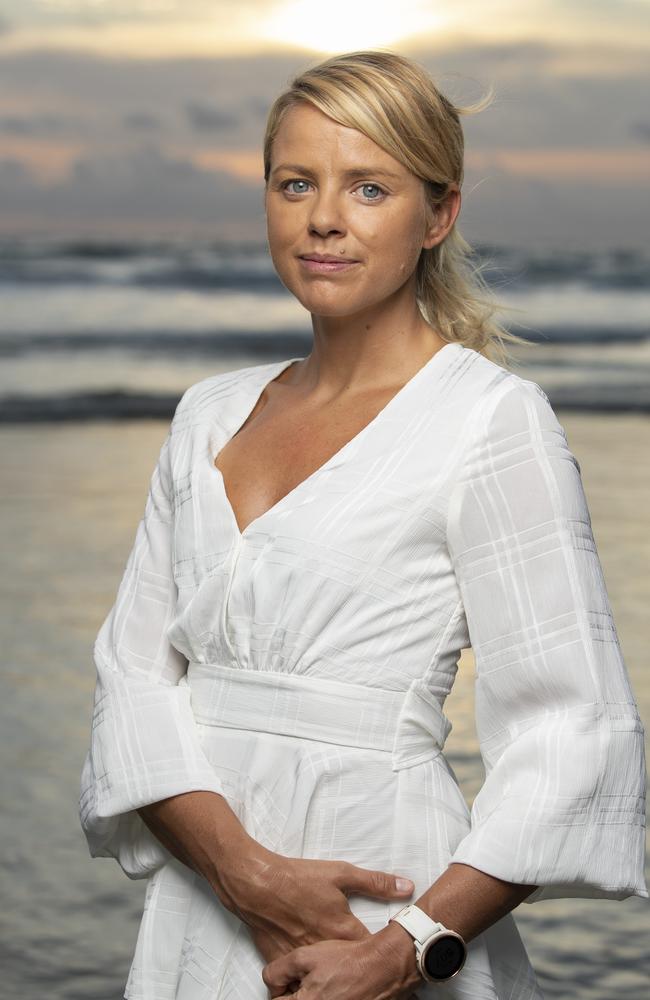
She didn’t want to frighten her family but knew it was serious so sent her sister, Emily, a message. “If I needed to come home (to Brisbane) for a while, could I stay with you?” it read. Her phone lit up with Emily calling back.
“It was a very emotional phone call, it was hard being on opposite sides of the world.
“She was pleading with me to come home.”
Mayberry did. The next year was spent in intense treatment and chemotherapy. “You have these ideas, hopes, dreams and desires of what you’re going to do with the next few years of your life and a trajectory you see for yourself. Then, within a few days hearing the words ‘it’s cancer’, your whole life changes and the future you imagined is forever altered.
“That was one of the most difficult things to be so young and have things be ripped away from me.”
On her first day of chemotherapy, Mayberry sat in the chair scrolling her iPhone looking for support groups; anyone to tell her how to get through this. She found The Wesley Hospital’s Choices Cancer Support Centre.
“When I needed a shoulder to cry on, when I needed advice to make treatment decisions, when I needed someone who could understand, who actually got it. Choices was there,” she says.
“The connections and the help available was a huge part of my recovery.”
She was given the confidence to know she could do it. She could find the silver linings.
“Not everything has been bad,” says Mayberry. “Throughout my treatment and my journey, I’ve grown to be a more resilient and a stronger person. I’ve created a life I really love and I still thrive in. It’s not what I imagined or where I thought I’d be but I definitely have so much to live for.”
Mayberry knows there are positives about what she’s been through, what she’s survived. When you’re faced with a grim diagnosis like cancer, she says, it shocks you into realising what’s important.
“It changes your perspective,” Mayberry says. “It changes your values and how you see things, for me, it’s changed how I make some decisions. You realise how incredibly valuable your time is.
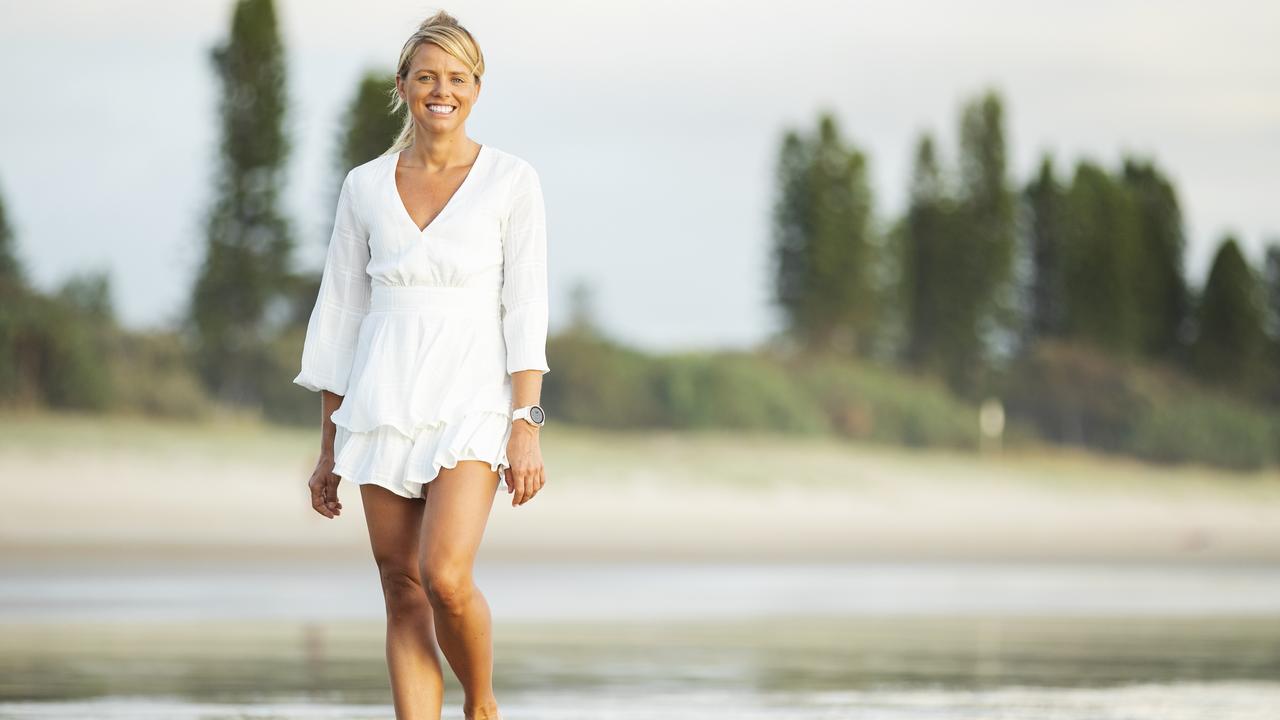
“It’s caused me to reflect on choices I make and decisions I make and how I want to live my life and not worry about the small things.”
Of all the things she’d dreamt of, a life by the beach was at the top, so late last year, Mayberry packed up her life in Brisbane and moved to Coolum. She opened a business as a clinical psychologist and hopes to be the support for others who are going through a difficult time.
Cancer will never define her, she won’t let it.
“I didn’t want to be treated differently or as if I was sick, I wanted to be treated just like everybody else that was walking down the street,” she says. “I had an incredible support team that would help me through all the treatments.”
But she knows it will always be part of her story and, as horrifying as it was, it’s shaped her.
“I’m feeling really positive and optimistic about the future,” she says. “I think 2020, granted everything that has happened, it’s been a great year for me. I’ve done some cool things and I’m really happy with where I am and how I’m choosing to live my life. My experience with cancer has taught me not just to survive, but to thrive and it’s brought me back to my passion for people and wanting to help make a difference.”
Mayberry is now living a healthy life. She still requires scans every six months but every day, she is grateful.
“You have one life and one shot, you want to make it count.”
ADAM FREEMAN
On February 24, 2020, Adam Freeman sent his eldest son a text message from his hospital bed. He had no idea when, or if, he would ever see him again.
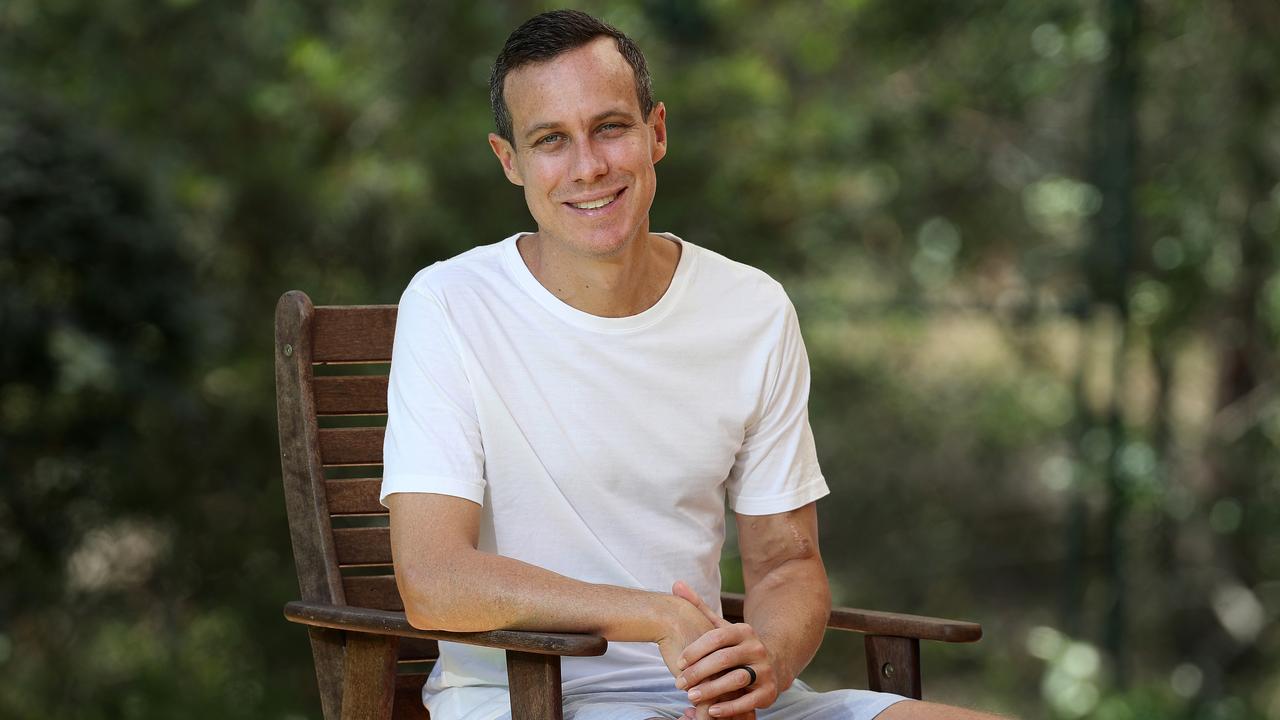
“It’s true, this infection is bad and that’s why I have been in hospital so long, and it’s true that this infection can kill people. What you need to know mate is your dad isn’t a normal person OK, your dad is a fighter, your dad is strong and your dad will never give up on getting better.”
A month earlier, doctors delivered Freeman, 38, a chilling diagnosis: “I don’t think we can save you.” All he could think about was his wife, Amy, 35, and their children, Blake, 12, Luca, 8, Charlie, 6, and Mikayla, 4. How would he prepare for the long goodbye?
The thought vanished as fast as it came.
The only way he was going to cope was not preparing at all. He was going to fight and it would be the fight of his life.
He would go on to become one of few people in the world with his condition to survive such an infection.
It’s December, 2020, and Freeman is playing aeroplanes with his curly, blonde-haired daughter, holding her tiny body and flying her through the air as she giggles down at him.
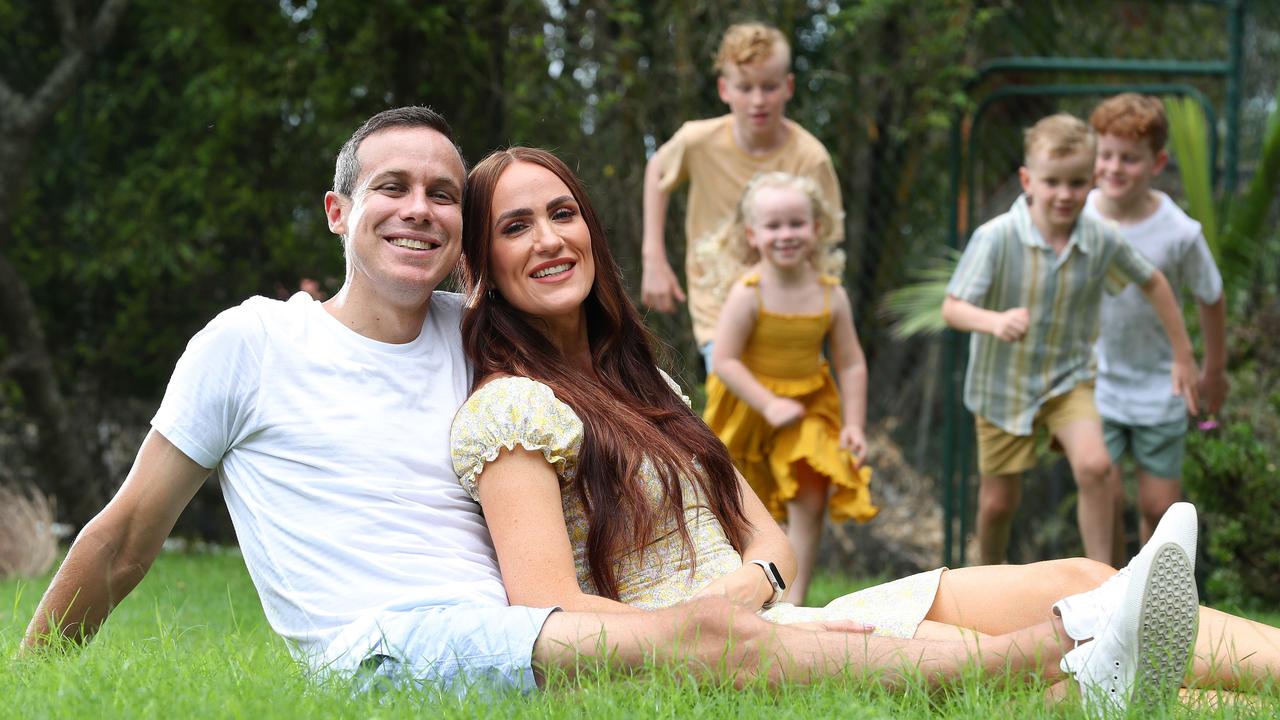
Everything seems normal. This bubble where everything is perfectly ordinary is extraordinary to Freeman.
Knowing what moments like these mean to this dad is to understand the years-long battle he has been through to survive.
In 2014, Freeman was diagnosed with chronic granulomatous disease, a condition that causes the immune system to fail, opening him up to a higher risk of infections.
His health worsened and he eventually went into kidney failure.
In 2018, he started dialysis while he waited for a kidney transplant. A year later, he had the transplant and, rightly so, thought that was the start of a new beginning. “I got the kidney in October, 2019, and I thought that was one of the best days of my life, I didn’t have to be on dialysis anymore,” he says.
“I had a new lease of life but unfortunately, it was the worst day of my life.”
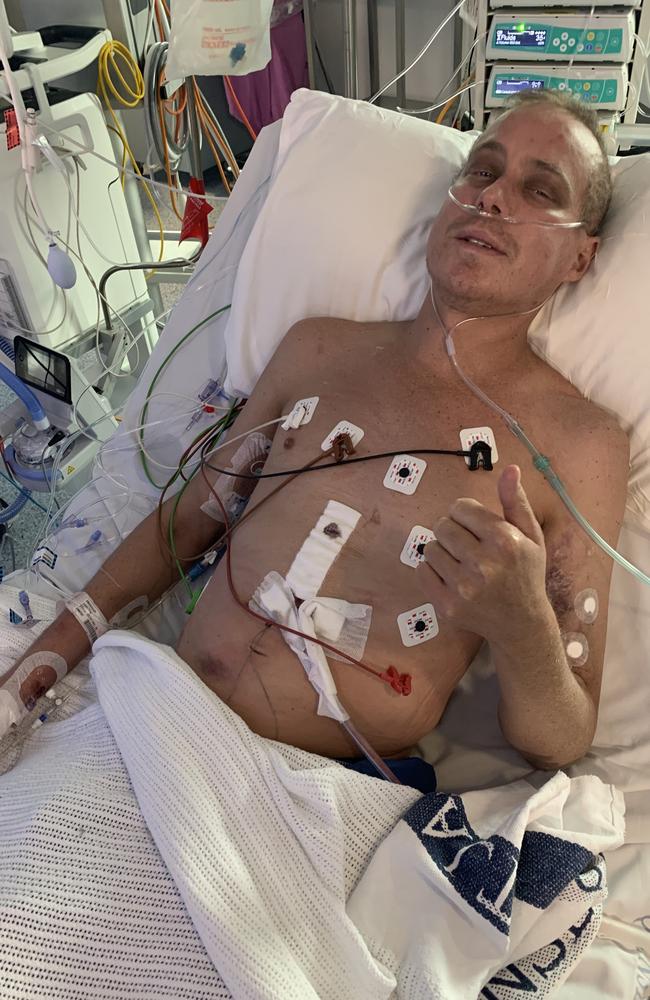
A few months later, on December 30, Freeman was overcome by headaches and rushed to hospital. He was diagnosed with aspergillus, a severe fungal mould infection that had spread to his lungs, skin, brain and heart. “Because I had the kidney transplant, it opened the door for this severe infection to riddle my body and that’s when I had to really start the fight,” he says.
Freeman spent the next seven months clinging to life in the Royal Brisbane and Women’s Hospital. His condition was complex and required seven complicated surgeries, six of those were open brain surgeries and one on his heart.
All were done to remove the infection rapidly taking hold of his body. More than 10 different medical teams worked on his treatment.
“I saw the infectious disease specialist and they sat down with me and their exact words were, ‘unfortunately, I don’t think we can save you’,” he recalls.
“That is the first time I had to come to terms with the prognosis.
My thoughts were about my four kids and my wife and not being a father or seeing them grow up and leaving my wife alone.”
When he told his wife, who herself has had thyroid cancer, his mind was racing with the darkest of thoughts.
“At that stage, you have to contemplate you might die and come to that realisation, you go through a lot of emotions and I did that for months,” he says.
He knew the pain and grief would swallow him whole if he didn’t light the fire within.
“It was a rollercoaster and I just decided, ‘no’, I need to change my mindset to get through this.” One picture kept him going. A photo of his wife and kids from a time when they were carefree and full of life. Freeman had multiple stints in ICU over the months. At his worst, he was bedbound for three weeks. He was so weak he could barely stand. To build up strength, mentally and physically, he gave himself a list of small, achievable goals. “I’d cling on to anything like, ‘OK, I got up and I had a shower’, it was anything I could see as moving forward.”
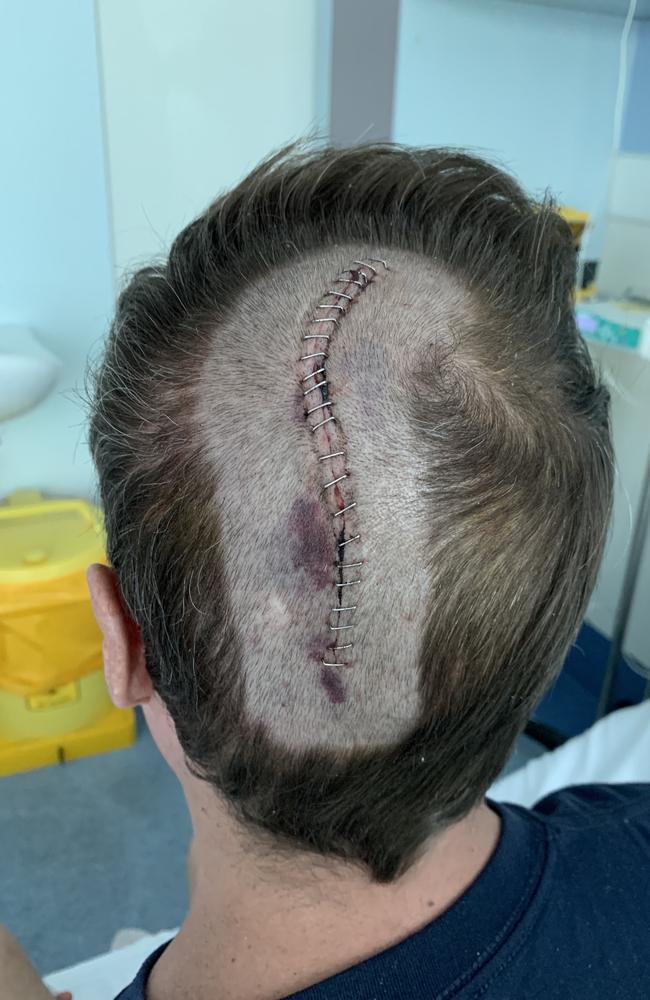
The pandemic forced restrictions to tighten and after his first month in hospital, kids under 16 were banned from visiting.
Freeman didn’t see his children again for six months.
“I only talked to them on Facetime, they are resilient when they don’t know what’s going on but my eldest son, Blake, knew what was going on,” he says. “That’s when I sent him that message.”
How do you talk about death with an almost 12 year old? How do you tell him he may grow up without a dad? Freeman spent days crafting the text, praying it wouldn’t be his last.
He still holds this message close to his heart. It’s the reminder he needs that he’s not going anywhere. Against all odds, Freeman walked out of that hospital on August 31, 2020.
The infectious disease team together with medical researchers at the University of Queensland Centre for Clinical Research worked to bring a trial of a new drug to RBWH which was to help treat Freeman’s brain infection and it has allowed him to return home while continuing treatment. He still has a long way to go.
He goes to hospital for dialysis three times a week. Impacts from the infection are also long-lasting and likely, he says, to stay with him forever. He has a loss of vision and impaired cognitive ability.
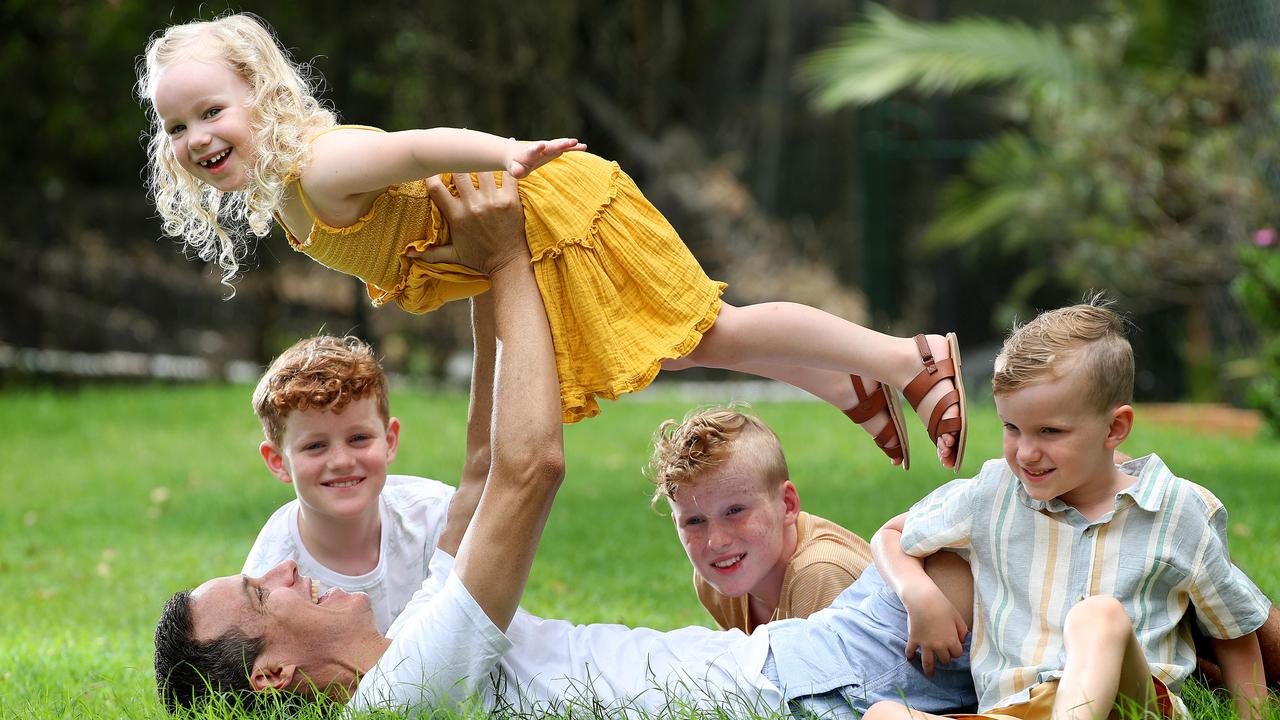
In the past, he worked long hours as a career-driven IT solution architect. But Freeman’s version of success has changed. Now it’s being there when his children get home from school. It’s snuggling them before they go to bed. It’s playing chess with his son and watching the others thrive at gymnastics. It’s being there to wake up beside his wife. “I completely redefined what is a priority, I had a busy lifestyle and in a lot of ways I prioritised work and now work doesn’t mean anything to me anymore. The things that matter are the people in our life and the loved ones. When you’re lying on your death bed, contemplating dying, you don’t think about any material object, any material object is inconsequential and you would give it up in a second.”
Freeman believes he wasn’t given a second chance but an epic hurdle to jump over. But he’s a better man because of it. “I make sure I don’t miss out on the little things with the kids,” he says. “I have so much value on all those little moments, often they’re the moments you are too busy for but they are all opportunities to learn more about them. I’ve always been a positive person but this has redefined what I truly value in life.”
KATE PHILLIPS
To look at her, you would never know.
You wouldn’t know how tightly Kate Phillips, 35, clung to life, how frequently her heart failed her or how urgent the race was to save her life. It’s also impossible to know from her joyous bright smile that doctors told her family more than 10 years ago she wouldn’t survive the night. What Phillips, who lives in Newstead, in inner northern Brisbane, has endured in her young lifetime is extraordinary – open heart surgery, a cardiac arrest at 24 and a double lung and heart transplant in 2013.
Her story is made even more incredible by her unbelievable transformation to become a triathlete two years after her transplant.
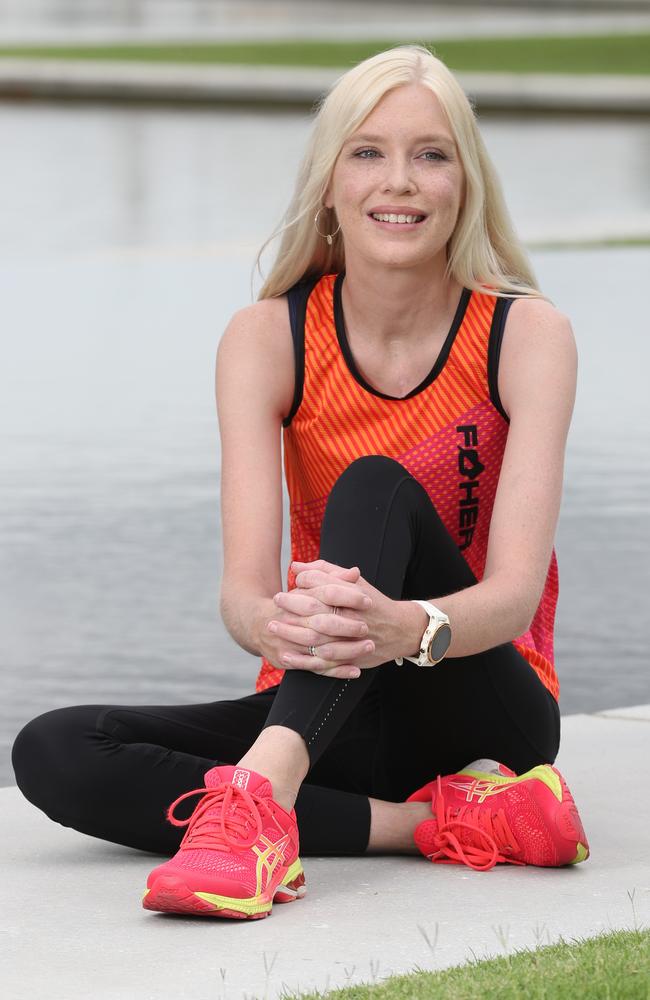
After 2020 and as the world adjusts to a new normal, Phillips has never been more grateful to be alive and, she says, continues to make the days count. It’s something she vowed to do ever since she was given the gift of life.
Phillips has competed in six half marathons, a marathon, half ironman and has plans to finish a full ironman this year. “When you’re lying in the hospital bed and told you don’t have much time left, all you’re thinking about is your family and what’s important,” she says. “You make the most of every moment and you hold onto those moments a lot more. Now I never say ‘no’ and I’m not afraid of the things I used to be afraid of.”
Phillips was born with a congenital heart disease, where there was a hole in her heart, and at 10 months old had open heart surgery and was fitted with a pacemaker. She was also diagnosed with pulmonary hypertension, a condition that causes an increase in blood pressure, placing a huge impact on her heart and lungs. The condition worsened in her teens and after falling ill with a virus, she spiralled. The average teen would’ve recovered faster but for Phillips, with a compromised immune system, it prompted a frightening new normal as her heart deteriorated. “I was getting really tired, shortness of breath and looking increasingly blue.
“I wasn’t myself and one of the characteristics of a lack of oxygen is your lips turning blue.
At 23, she went into pulmonary hypertensive crisis, requiring emergency surgery. Her body only continued to get weaker.
Six months later, during a health test at the hospital, Phillips went into cardiac arrest. If she wasn’t in the hospital at the time, she knows how different the situation could have been. Phillips was young and despised the sympathy, and barely told her friends what she was going through. It meant, however, she never fully admitted to herself how sick she was until the day she came home from a walk around the block feeling light-headed and dizzy. She blacked out and remembers waking up alone on her bathroom floor. “I’d slipped, fallen and hit my head … it was terrifying,” she says. “I remember knowing that was it, that was the time I knew I needed a heart transplant.”
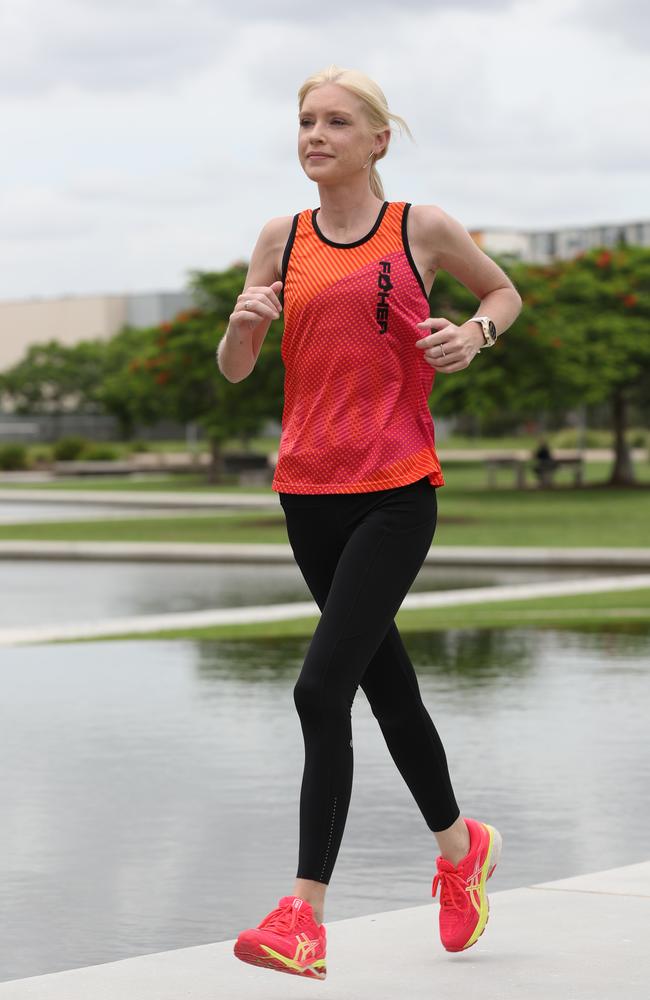
She was told it would be a three-year wait for her transplant but she knew she didn’t have that long. “My condition deteriorated rapidly … I ended up being too sick to leave hospital … it was a race against the clock, I was escalated to priority on the transplant list.”
Three months later, Phillips was given the gift of life.
“It was just in the nick of time,” she remembers.
“My whole life up until my transplant, I had worked so hard to stay alive, then this happened and my life was so much richer for it. I experienced so many things for the first time in my life. I couldn’t even comprehend how deep a breath I could take, how strong my heart felt … I didn’t realise how unwell I was because I didn’t know any other way. I was so amazed I could walk and talk at the same time, I thought to myself, ‘can everyone do this?’ It was the little things like being able to sing and not get breathless. There is no greater gift.”
She wanted to experience all the things she’d wanted to do before but couldn’t, including triathlons.
“I always felt like a sporty person trapped in the wrong body,” she laughs.
Two months after her transplant, she walked the 5km Bridge to Brisbane, months later she competed in the ocean swim leg of the Noosa Triathlon and two years on, she did the full triathlon.
“I was always going to fight … it was never a choice, you just have to keep on going,” she says.
Her journey is one with dark shadows but Phillips has made sure to always uncover the hope.




